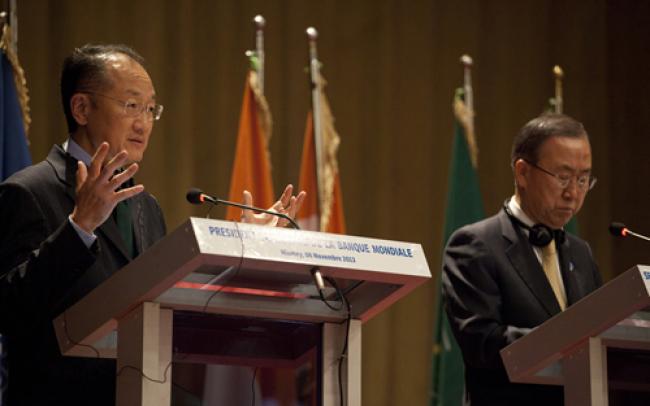During a historic trip to the region by leaders from five international organizations – the United Nations, the World Bank, the African Union, the African Development Bank, and the European Union – Dr. Kim announced the USD 200 million Sahel Women’s Empowerment and Demographics Project.
The initiative, which builds on the Bank’s existing USD 150 million in commitments over the next two years for maternal and child health programmes in the Sahel, will work across the region to improve the availability and affordability of reproductive health commodities, strengthen specialized training centres for rural-based midwifery/nursing services, and to pilot and share knowledge on adolescent girls’ initiatives.
While Niger and most of the countries in the Sahel have reduced child mortality significantly in recent years, maternal and child mortality levels remain high, as do fertility rates.
“This call to action on women’s empowerment and demographics is not simply about numbers. It is about people. When women and girls have the tools to shape their own future, they will advance development for all,” said Ban, who is on his second joint visit to Africa with the World Bank chief.
He cited the need to not only take steps to support women, but also the need to change mindsets. “Women should be able to demand their rights. But I also want men to join this call.
“Help us create conditions where your daughters, your sisters and your wives have full equality. Help us create a society where women never have to fear violence at the hands of men. Help us create families where mothers and fathers decide together how many children they want to have. The time to do this is now,” he stated at the launch of the new initiative.
“I have full confidence that the men of Niger and the Sahel can support the women here, and that together you can open a new future.”
Financed by the World Bank’s International Development Association (IDA) – its fund for the world’s poorest countries – the new programme will be closely coordinated with UN agencies and other development partners, and will build on existing investments and analyses of Africa’s demographic dividend already being supported by the World Bank Group.
“As we work towards ending poverty across the developing world, we know that educating adolescent girls and getting health services to women will lead to greater prosperity not just for individual families but also for entire economies,” said Dr. Kim. “This link is even more critical when countries, such as those of the Sahel, have fast-growing youth populations and are trying to make timely investments to reap a major set of economic gains known as the demographic dividend.”
Of the World Bank Group’s USD 350 million for the women’s empowerment and demographics programme – including the USD 200 million pledge made Wednesday – up to USD 100 million is expected to go to the UN Population Fund (UNFPA). Much of the funding to the UNFPA will be based on country requests for reproductive health commodities and services.
“High fertility, rapid population growth and a large youth population present unique challenges in the Sahel. Where choices improve for women and girls, fertility declines and opportunities expand,” said UNFPA Executive Director Babatunde Osotimehin.
“Raising the age of marriage, keeping girls in school, enabling women through family planning to decide the spacing and number of their children, and investing in the health and education of young people, particularly young girls, can unlock a powerful demographic dividend and set countries in the Sahel on the path to sustained, inclusive social and economic growth. The time to act is now.”
Niger is the second stop on a wider trip to the Sahel region for the development leaders that began in Mali and will also include Burkina Faso and Chad.
The Sahel has suffered three major droughts in less than a decade. More than 11 million people are at risk of hunger and 5 million children under five are at risk of acute malnutrition. In addition, political instability and unconstitutional changes in Governments have had significant economic and social consequences in the region and terrorist acts, as well as organized crime, have threatened the region’s stability.
Secretary-General Bank Ki-moon (right) and World Bank Group President Jim Yong Kim speak to the media in Niamey, Niger. Photo: World Bank/Dominic Chavez
